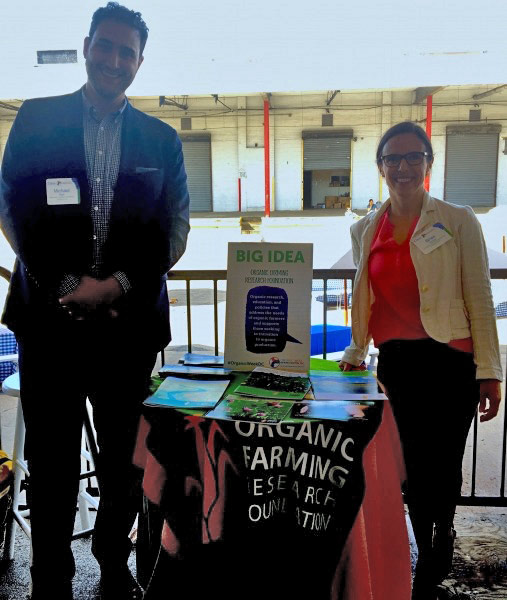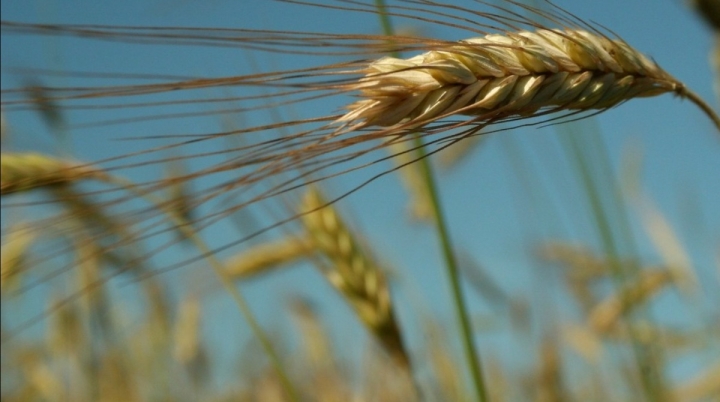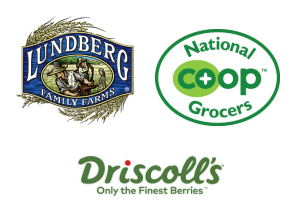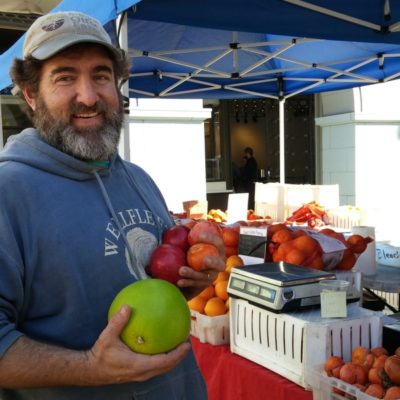March 22, 2019 – We were thrilled to offer scholarships to attend our Organic Agriculture Research Forum in February and wanted share feedback we received from some of the recipients. Thanks once again to Ceres Trust for funding the scholarship program. As you will see from the comments below, their investment yields a strong return in the continuing education of both farmers and researchers.
DeLisa A. Lewis, Green Fire Farm
 I came to the Organic Agriculture Research Forum in Portland wearing two different hats, farmer and researcher. My family and I own a diverse, 40-acre farm in the Cowichan Valley on Vancouver Island, British Columbia, and I teach and carry out on-farm field trials, focused on soil health assessment, with the Faculty of Land and Food Systems at the University of British Columbia (UBC), in Canada. My goal was to hear from and connect with other organic systems researchers, farmers, and farm systems suppliers, and the research forum and trade show gave me all that and more! Over the delicious breakfast, a former co-worker from the UBC Farm found me, and we enjoyed a good catch-up session on family and farming. Grafting has been an interest for both of our farming operations since 2014, and the first Research Forum session was an outstanding, fast-paced overview of practical progress on that front. As an on-farm researcher, improving outreach efforts and field research design are ongoing areas of focus, and the lively Q&A sessions following each talk provided useful synthesis and additional connections for each of those key points. Break times and lunch were great opportunities to enjoy the bounty of the Pacific Northwest growing region, and to connect with growers and trade show vendors. With plastic bag bans and the food systems waste stream challenge at the forefront of the conversation in many of our Vancouver Island cities, I especially appreciated the award- winning packaging display of A&A produce. Also, during the break, I re-connected with Diane Nichols, of the UC Santa Cruz Farm & Garden Project. My organic farming life began in Santa Cruz, farming under the mentorship of a former Apprentice leader, Dennis Tamura. The deep and wide roots of the organic farming, research and teaching communities that reach up the west coast and into British Columbia were well represented at this Forum, and I am deeply appreciative for the opportunities to be present and recharge.
I came to the Organic Agriculture Research Forum in Portland wearing two different hats, farmer and researcher. My family and I own a diverse, 40-acre farm in the Cowichan Valley on Vancouver Island, British Columbia, and I teach and carry out on-farm field trials, focused on soil health assessment, with the Faculty of Land and Food Systems at the University of British Columbia (UBC), in Canada. My goal was to hear from and connect with other organic systems researchers, farmers, and farm systems suppliers, and the research forum and trade show gave me all that and more! Over the delicious breakfast, a former co-worker from the UBC Farm found me, and we enjoyed a good catch-up session on family and farming. Grafting has been an interest for both of our farming operations since 2014, and the first Research Forum session was an outstanding, fast-paced overview of practical progress on that front. As an on-farm researcher, improving outreach efforts and field research design are ongoing areas of focus, and the lively Q&A sessions following each talk provided useful synthesis and additional connections for each of those key points. Break times and lunch were great opportunities to enjoy the bounty of the Pacific Northwest growing region, and to connect with growers and trade show vendors. With plastic bag bans and the food systems waste stream challenge at the forefront of the conversation in many of our Vancouver Island cities, I especially appreciated the award- winning packaging display of A&A produce. Also, during the break, I re-connected with Diane Nichols, of the UC Santa Cruz Farm & Garden Project. My organic farming life began in Santa Cruz, farming under the mentorship of a former Apprentice leader, Dennis Tamura. The deep and wide roots of the organic farming, research and teaching communities that reach up the west coast and into British Columbia were well represented at this Forum, and I am deeply appreciative for the opportunities to be present and recharge.
Brian A. Mitchell, Colorado State University
As a PhD student and researcher at Colorado State University, I value the science-backed information that was presented at the OARF. It was interesting to listen to and engage with more than a dozen speakers, who discussed topics ranging from mycorrhizal fungi use in organic systems to the economics of utilizing whole-farm insurance to climate change modeling for organic agriculture. There are so many exciting projects going on at universities around the country focused on understanding and improving organic agriculture!
Nicolette Lax
During the two years I conducted my thesis on season extension practices for organic agriculture, many sunny days in the lab were spent thinking about working more outside, on the farm. Every field day left me inspired to get back out to the farm, and helped me see the importance of the research I was conducting.
Now, having spent three seasons out of the lab and permanently on an organic farm, I often daydream about researching the questions and problems we encounter every day. When we’re in the hustle of the summer season we only have time to postulate solutions to our pest problems, more efficient cultivation practices, or more quantitative evaluations of our soil. This winter, upon reflection, I realized there shouldn’t be such a dichotomy between my love for farming and my interest in research.
At the forum, I was finally able to wear both hats, of a farmer and a researcher, and gain a broader perspective from having both backgrounds. It seemed many other folks in the room where also of these mixed backgrounds, which made for very interesting and relevant research being shared. The forum offered a glimpse into the possibilities of connecting farmers and researchers, and inspired me to pursue this collaboration. I felt that I left the forum with an array of resources that I’m excited to bring to the farm this season, as well as an understanding of other research opportunities and connections that exist in the sustainable agriculture community.
Sarah Barney
MS student and National Science Foundation Graduate Research Fellow in the School for Environment and Sustainability at the University of Michigan
My first time at Organicology went above and beyond my expectations. As an academic by training and a beginning farmer, I enjoyed the diversity of the participants and content at the conference. While I have attended many academic conferences in the past, I appreciated the Organic Agriculture Research Forum as it allowed for discussion of agricultural research with non-academics. This kind of bridging across industry, academia, grass-roots organizations and farmers is critical to the continued success of sustainable agriculture and its contribution to a more just food system. This will definitely not be my last Organicology!
Tessa Barker
Oregon State University, incoming Crop Science Graduate Student
 As a graduating senior and soon-to-be graduate student, this was my first time attending the forum. I was pleasantly surprised by the diversity in oral presentation and poster topics, ranging from crop insurance, to pest management, and whether or not organic farmers were ready for new food safety regulations. At the same time, throughout the day I started to see connections between the array of topics, and the projects my own research team works on. One presentation that we all found intriguing was Amanda Marabesi’s talk, entitled, “A phenomenological inquiry into producers’ experiences growing organic produce.” As part of the social science segment, this presentation centered on a survey of growers and extension agents, regarding their experience with organic agriculture in Georgia. Our team has conducted a number of surveys, and I am currently in the midst of conducting interviews with olive growers in Oregon. Despite the different regions and questions our surveys focused on, I found it enlightening to see how Marabesi presented her findings, and how she used the data to tell a larger story about the organic industry in Georgia.
As a graduating senior and soon-to-be graduate student, this was my first time attending the forum. I was pleasantly surprised by the diversity in oral presentation and poster topics, ranging from crop insurance, to pest management, and whether or not organic farmers were ready for new food safety regulations. At the same time, throughout the day I started to see connections between the array of topics, and the projects my own research team works on. One presentation that we all found intriguing was Amanda Marabesi’s talk, entitled, “A phenomenological inquiry into producers’ experiences growing organic produce.” As part of the social science segment, this presentation centered on a survey of growers and extension agents, regarding their experience with organic agriculture in Georgia. Our team has conducted a number of surveys, and I am currently in the midst of conducting interviews with olive growers in Oregon. Despite the different regions and questions our surveys focused on, I found it enlightening to see how Marabesi presented her findings, and how she used the data to tell a larger story about the organic industry in Georgia.
During the poster session, I presented on my team’s research on containerized strawberry transplants, and experienced the thrill of sharing this project in which I had invested so much hard work and effort. Due to the small size of the poster session, I was able to walk around and meet the other presenters, and connect with those doing work that was similar to mine. The poster I found most interesting was Claire Hodge’s, exploring deep winter greenhouses in Minnesota. Again, this research involved a very different climate than Oregon, where I have done all of my student research. However, we found common ground in that both of our research teams are exploring season extension.
Attending this conference allowed me to see people at all stages of their careers, asking important questions about organic agriculture. But perhaps more importantly, it reminded me of the value of connecting across different regions, different crops, and different disciplines in terms of natural or social science. In my day-to-day student research, I tend to be fairly focused on the crops our team focuses on. However, not all of the resources and connections I find concern organic production of these crops. Events like the OARF are unique in that they bring organic researchers together, not only to find what we have in common, but also to inspire one another and consider approaches we may never before have encountered.




 May 30, 2019 – OFRF’s wildly popular webinar series on soil health and organic farming is now archived and available to view on-demand. Registration numbers for the live webinars were off the charts, causing eOrganic to have to upgrade their platform to handle the volume. Thousands of farmers, agriculture professionals, and researchers from 48 states and 14 countries attended the live webinars. The archived versions have been viewed over 7,000 times!
May 30, 2019 – OFRF’s wildly popular webinar series on soil health and organic farming is now archived and available to view on-demand. Registration numbers for the live webinars were off the charts, causing eOrganic to have to upgrade their platform to handle the volume. Thousands of farmers, agriculture professionals, and researchers from 48 states and 14 countries attended the live webinars. The archived versions have been viewed over 7,000 times! The webinars align with topics covered in OFRF’s Soil Health and Organic Farming Guidebooks to explore the most recent research on soil health practices, while offering practical guidelines for building healthy soil.
The webinars align with topics covered in OFRF’s Soil Health and Organic Farming Guidebooks to explore the most recent research on soil health practices, while offering practical guidelines for building healthy soil.

 May 21, 2019 – OFRF has awarded a grant to Aysha Peterson at UC Santa Cruz to examine barriers to adoption of plant-based nutrient management strategies among organic, socially disadvantaged farmers in Salinas, California. Peterson hopes to bridge the gap between research and implementation by using qualitative data to answer questions about adoption and decision-making processes.
May 21, 2019 – OFRF has awarded a grant to Aysha Peterson at UC Santa Cruz to examine barriers to adoption of plant-based nutrient management strategies among organic, socially disadvantaged farmers in Salinas, California. Peterson hopes to bridge the gap between research and implementation by using qualitative data to answer questions about adoption and decision-making processes.




 May 5, 2019 – Proceedings from the 2019 Organic Agriculture Research Forum are now available. This day-long event held on February 16th in Portland Oregon, featured innovative presentations from researchers across all disciplines related to organic farming and food systems.
May 5, 2019 – Proceedings from the 2019 Organic Agriculture Research Forum are now available. This day-long event held on February 16th in Portland Oregon, featured innovative presentations from researchers across all disciplines related to organic farming and food systems. April 29, 2019 – Development, testing, and release of resistant varieties is essential to controlling downy mildew and bacterial wilt, diseases that pose a significant and costly production challenge for organic farmers. OFRF is pleased to announce a second-year research grant to Edmund Frost of Common Wealth Seed Growers to continue his assessment of downy mildew resistant cucumber seedstocks. Frost will focus on evaluating and advancing cucumber seedstock lines that performed well in his 2018 trials.
April 29, 2019 – Development, testing, and release of resistant varieties is essential to controlling downy mildew and bacterial wilt, diseases that pose a significant and costly production challenge for organic farmers. OFRF is pleased to announce a second-year research grant to Edmund Frost of Common Wealth Seed Growers to continue his assessment of downy mildew resistant cucumber seedstocks. Frost will focus on evaluating and advancing cucumber seedstock lines that performed well in his 2018 trials.


 April 16, 2019 – OFRF announced the first of five grants the organization will award this year focused on the most pressing challenges facing organic farmers and ranchers today. The grant is funded in part by a match from the Foundation for Food and Agriculture Research (FFAR) aimed at funding research related to improving soil health and reducing the environmental impacts of agriculture.
April 16, 2019 – OFRF announced the first of five grants the organization will award this year focused on the most pressing challenges facing organic farmers and ranchers today. The grant is funded in part by a match from the Foundation for Food and Agriculture Research (FFAR) aimed at funding research related to improving soil health and reducing the environmental impacts of agriculture.
 I came to the Organic Agriculture Research Forum in Portland wearing two different hats, farmer and researcher. My family and I own a diverse, 40-acre farm in the Cowichan Valley on Vancouver Island, British Columbia, and I teach and carry out on-farm field trials, focused on soil health assessment, with the Faculty of Land and Food Systems at the University of British Columbia (UBC), in Canada. My goal was to hear from and connect with other organic systems researchers, farmers, and farm systems suppliers, and the research forum and trade show gave me all that and more! Over the delicious breakfast, a former co-worker from the UBC Farm found me, and we enjoyed a good catch-up session on family and farming. Grafting has been an interest for both of our farming operations since 2014, and the first Research Forum session was an outstanding, fast-paced overview of practical progress on that front. As an on-farm researcher, improving outreach efforts and field research design are ongoing areas of focus, and the lively Q&A sessions following each talk provided useful synthesis and additional connections for each of those key points. Break times and lunch were great opportunities to enjoy the bounty of the Pacific Northwest growing region, and to connect with growers and trade show vendors. With plastic bag bans and the food systems waste stream challenge at the forefront of the conversation in many of our Vancouver Island cities, I especially appreciated the award- winning packaging display of A&A produce. Also, during the break, I re-connected with Diane Nichols, of the UC Santa Cruz Farm & Garden Project. My organic farming life began in Santa Cruz, farming under the mentorship of a former Apprentice leader, Dennis Tamura. The deep and wide roots of the organic farming, research and teaching communities that reach up the west coast and into British Columbia were well represented at this Forum, and I am deeply appreciative for the opportunities to be present and recharge.
I came to the Organic Agriculture Research Forum in Portland wearing two different hats, farmer and researcher. My family and I own a diverse, 40-acre farm in the Cowichan Valley on Vancouver Island, British Columbia, and I teach and carry out on-farm field trials, focused on soil health assessment, with the Faculty of Land and Food Systems at the University of British Columbia (UBC), in Canada. My goal was to hear from and connect with other organic systems researchers, farmers, and farm systems suppliers, and the research forum and trade show gave me all that and more! Over the delicious breakfast, a former co-worker from the UBC Farm found me, and we enjoyed a good catch-up session on family and farming. Grafting has been an interest for both of our farming operations since 2014, and the first Research Forum session was an outstanding, fast-paced overview of practical progress on that front. As an on-farm researcher, improving outreach efforts and field research design are ongoing areas of focus, and the lively Q&A sessions following each talk provided useful synthesis and additional connections for each of those key points. Break times and lunch were great opportunities to enjoy the bounty of the Pacific Northwest growing region, and to connect with growers and trade show vendors. With plastic bag bans and the food systems waste stream challenge at the forefront of the conversation in many of our Vancouver Island cities, I especially appreciated the award- winning packaging display of A&A produce. Also, during the break, I re-connected with Diane Nichols, of the UC Santa Cruz Farm & Garden Project. My organic farming life began in Santa Cruz, farming under the mentorship of a former Apprentice leader, Dennis Tamura. The deep and wide roots of the organic farming, research and teaching communities that reach up the west coast and into British Columbia were well represented at this Forum, and I am deeply appreciative for the opportunities to be present and recharge. As a graduating senior and soon-to-be graduate student, this was my first time attending the forum. I was pleasantly surprised by the diversity in oral presentation and poster topics, ranging from crop insurance, to pest management, and whether or not organic farmers were ready for new food safety regulations. At the same time, throughout the day I started to see connections between the array of topics, and the projects my own research team works on. One presentation that we all found intriguing was Amanda Marabesi’s talk, entitled, “A phenomenological inquiry into producers’ experiences growing organic produce.” As part of the social science segment, this presentation centered on a survey of growers and extension agents, regarding their experience with organic agriculture in Georgia. Our team has conducted a number of surveys, and I am currently in the midst of conducting interviews with olive growers in Oregon. Despite the different regions and questions our surveys focused on, I found it enlightening to see how Marabesi presented her findings, and how she used the data to tell a larger story about the organic industry in Georgia.
As a graduating senior and soon-to-be graduate student, this was my first time attending the forum. I was pleasantly surprised by the diversity in oral presentation and poster topics, ranging from crop insurance, to pest management, and whether or not organic farmers were ready for new food safety regulations. At the same time, throughout the day I started to see connections between the array of topics, and the projects my own research team works on. One presentation that we all found intriguing was Amanda Marabesi’s talk, entitled, “A phenomenological inquiry into producers’ experiences growing organic produce.” As part of the social science segment, this presentation centered on a survey of growers and extension agents, regarding their experience with organic agriculture in Georgia. Our team has conducted a number of surveys, and I am currently in the midst of conducting interviews with olive growers in Oregon. Despite the different regions and questions our surveys focused on, I found it enlightening to see how Marabesi presented her findings, and how she used the data to tell a larger story about the organic industry in Georgia.